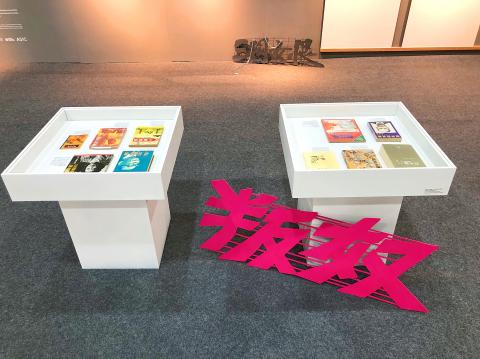Books that were banned in Taiwan during the White Terror era were displayed at the Seoul International Book Fair, which closed yesterday.
The Taipei International Book Exhibition Foundation contributed to the “Banned Books: Spirits from the Bamboo Grove” exhibition at the invitation of the fair, alongside publishers’ associations from Japan, Malaysia, Thailand and Turkey, as well as Seoul National University.
The chief planners of the Taiwanese content were publisher and former presidential adviser Rex How (郝明義), who is also the foundation’s managing supervisor, and Liao Wei-min (廖為民), who wrote The Story of Banned Books in Taiwan (台灣禁書的故事).

Photo courtesy of the Taipei International Book Exhibition Foundation
The organizations collaborated to display the formerly forbidden books to contextualize the history of literary censorship in Asia and to highlight the importance of freedom of the press, How said on Thursday.
Books on display were selected from the vast array of works proscribed during the White Terror era, or the period from 1949 to 1987 when the then-Chinese Nationalist Party (KMT) government ruled via martial law, he said.
The selection was a cross-section of the government’s press censorship, he said.
The government suppressed works of communist literature, such as Karl Marx’s Das Kapital and The Communist Manifesto, and books written by intellectuals who stayed in China after 1949, such as Lu Xun’s (魯迅) The True Story of Ah-Q (阿Q正傳) and Lao She’s (老社) Rickshaw Boy (駱駝祥子), he said.
The Legends of the Condor Heroes (射鵰英雄傳), a Wuxia novel — a genre of fiction about martial artists in ancient China — was banned because its author, Hong Konger Jin Yong (金庸), was suspected of having leftist sympathies and ties to Beijing, How said.
Books whose subject matter touched upon the 228 Massacre or the Japanese colonial era were banned, such as Su Ben’s (史明) Taiwan’s 400 Year History (台灣人四百年史), or books written by liberals who the government persecuted, including Lei Chen (雷震) and Yin Hai-kuang (殷海光), he said.
Chiang Kai-shek (蔣介石) and his son and successor Chiang Ching-kuo (蔣經國) also banned books by people who they held grudges against, such as Bo Yang (柏楊) and Chiang Nan (江南), he said.
Li Ai’s (李敖) books were banned because he was known for spurning authority, while An Anthology of Dangwai Literature (黨外文選) by Yao Chia-wen (姚嘉文) and Chen Chu (陳菊) was banned for being political literature originating from outside the KMT, he said.
The government also suppressed works deemed to challenge traditional sexual mores, such as sociologist Zhang Jingsheng’s (張競生) A History of Sex (性史) and Kuo Liang-hui’s (郭良蕙) The Locked Heart (心鎖), he said.

Taiwanese can file complaints with the Tourism Administration to report travel agencies if their activities caused termination of a person’s citizenship, Mainland Affairs Council Minister Chiu Chui-cheng (邱垂正) said yesterday, after a podcaster highlighted a case in which a person’s citizenship was canceled for receiving a single-use Chinese passport to enter Russia. The council is aware of incidents in which people who signed up through Chinese travel agencies for tours of Russia were told they could obtain Russian visas and fast-track border clearance, Chiu told reporters on the sidelines of an event in Taipei. However, the travel agencies actually applied

Japanese footwear brand Onitsuka Tiger today issued a public apology and said it has suspended an employee amid allegations that the staff member discriminated against a Vietnamese customer at its Taipei 101 store. Posting on the social media platform Threads yesterday, a user said that an employee at the store said that “those shoes are very expensive” when her friend, who is a migrant worker from Vietnam, asked for assistance. The employee then ignored her until she asked again, to which she replied: "We don't have a size 37." The post had amassed nearly 26,000 likes and 916 comments as of this

New measures aimed at making Taiwan more attractive to foreign professionals came into effect this month, the National Development Council said yesterday. Among the changes, international students at Taiwanese universities would be able to work in Taiwan without a work permit in the two years after they graduate, explainer materials provided by the council said. In addition, foreign nationals who graduated from one of the world’s top 200 universities within the past five years can also apply for a two-year open work permit. Previously, those graduates would have needed to apply for a work permit using point-based criteria or have a Taiwanese company

The Shilin District Prosecutors’ Office yesterday indicted two Taiwanese and issued a wanted notice for Pete Liu (劉作虎), founder of Shenzhen-based smartphone manufacturer OnePlus Technology Co (萬普拉斯科技), for allegedly contravening the Act Governing Relations Between the People of the Taiwan Area and the Mainland Area (臺灣地區與大陸地區人民關係條例) by poaching 70 engineers in Taiwan. Liu allegedly traveled to Taiwan at the end of 2014 and met with a Taiwanese man surnamed Lin (林) to discuss establishing a mobile software research and development (R&D) team in Taiwan, prosecutors said. Without approval from the government, Lin, following Liu’s instructions, recruited more than 70 software